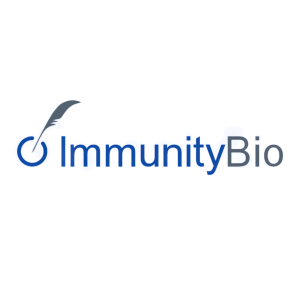ImmunityBio Presents Positive Long-Term Overall Survival Data in Non-Small Cell Lung Cancer Patients and Announces Registrational Intent Phase 3 Trials with ANKTIVA® and Checkpoint Immunotherapy at World Conference on Lung Cancer
- Phase 2 data presented at the World Conference on Lung Cancer showing a prolonged median overall survival of over 14 months in 2nd and 3rd line NSCLC cancer patients who progressed on checkpoint inhibitors such as KEYTRUDA (pembrolizumab) and OPDIVO (nivolumab)
-
ANKTIVA plus KEYTRUDA or OPDIVO rescued T cell activity in these patients who progressed on the same checkpoint inhibitor with overall survival of
57% at 12 months - Long-term survival was independent of PDL1 tumor status and independent of 2nd or 3rd line of therapy
- The data continues to validate the mechanism of action of ANKTIVA in activating NK, CD8 killer, and Memory T cells resulting in prolonged overall survival in patients with advanced cancers
- Data supports global launch of Phase 3 randomized control of ResQ trials of ANKTIVA plus KEYTRUDA or OPDIVO in 1st and 2nd line NSCLC (ResQ301 and ResQ302) versus standard of care
The phase 2b study of ANKTIVA (nogapendekin alfa inbakicept-pmln) in combination with checkpoint inhibitors KEYTRUDA or OPDIVO in multiple tumor types including NSCLC who failed CPI showed long-term overall survival of 57 percent (49/86) and 34 percent (29/86) at 12 and 18 months respectively, exceeding the current standard of care.
“Most NSCLC patients experience progression following checkpoint inhibitors, with average survival well under a year when checkpoint inhibitor-based therapies fail our patients,” said Dr. Wrangle. “The QUILT-3.055 study enrolled patients relapsed after CPI and CPI in combination with chemotherapy and showed that, regardless of prior therapy, adding the IL-15-based superagonist ANKTIVA to their therapy could rescue checkpoint activity likely through activation of NK cells, CD4+, CD8+, and memory T cells. The survival rate in these patients on their 2nd or 3rd line of cancer therapy is impressive and exceeds what you might expect from the current standard of care.”
About the QUILT-3.055 Study
Non-small cell lung cancer occurs when malignant cells form in the lung’s tissue and it accounts for approximately
The QUILT-3.055 study examined overall survival in 86 patients with 2nd and 3rd line+ NSCLC who were previously treated and failed either CPI alone or failed CPI in combination with chemotherapy. These patients had received no intervening therapy. Patients received ANKTIVA 15 mcg/kg subcutaneously every 3 weeks in combination with the same checkpoint inhibitor they previously received and on which they had progressed.
The median OS (n=86) was 14.1 months (
ANKTIVA plus CPI therapy in 2nd line or greater NSCLC demonstrated long-term median OS, independent of PDL1 status, and independent of prior lines of therapy in patients with acquired resistance to CPI. These findings support the novel mechanism of action of ANKTIVA to rescue CPI activity through the activation of NK and T cells, driving long-term memory, with median overall survival of
Based on the results of the QUILT 3.055 study and other trials involving ANKTIVA with checkpoint inhibitors, ImmunityBio is opening Phase 3 trials of ANKTIVA plus KEYTRUDA or OPDIVO in 1st and 2nd line NSCLC.
“The clinical trial protocol was designed such that the duration of experimental therapy with ANKTIVA plus CPI was 24 months, and thereafter no further ANKTIVA doses were administered. Despite this, the results demonstrated that
About ANKTIVA®
The cytokine interleukin-15 (IL-15) plays a crucial role in the immune system by affecting the development, maintenance, and function of key immune cells—NK and CD8+ killer T cells—that are involved in killing cancer cells. By activating NK cells, ANKTIVA overcomes the tumor escape phase of clones resistant to T cells and restores memory T cell activity with resultant prolonged duration of complete response.
ANKTIVA is a first-in-class IL-15 agonist IgG1 fusion complex, consisting of an IL-15 mutant (IL-15N72D) fused with an IL-15 receptor alpha, which binds with high affinity to IL-15 receptors on NK, CD4+, and CD8+ T cells. This fusion complex of ANKTIVA mimics the natural biological properties of the membrane-bound IL-15 receptor alpha, delivering IL-15 by dendritic cells and drives the activation and proliferation of NK cells with the generation of memory killer T cells that have retained immune memory against these tumor clones. The proliferation of the trifecta of these immune killing cells and the activation of trained immune memory results in immunogenic cell death, inducing a state of equilibrium with durable complete responses. ANKTIVA has improved pharmacokinetic properties, longer persistence in lymphoid tissues, and enhanced anti-tumor activity compared to native, non-complexed IL-15 in-vivo.
ANKTIVA was recently approved by the FDA for BCG-unresponsive non-muscle invasive bladder cancer CIS with or without papillary tumors. For more information, visit Anktiva.com.
Indication and Important Safety Information
INDICATION AND USAGE
ANKTIVA is an interleukin-15 (IL-15) receptor agonist indicated with Bacillus Calmette-Guerin (BCG) for the treatment of adult patients with BCG-unresponsive nonmuscle invasive bladder cancer (NMIBC) with carcinoma in situ (CIS) with or without papillary tumors.
WARNINGS AND PRECAUTIONS
Risk of Metastatic Bladder Cancer with Delayed Cystectomy. Delaying cystectomy can lead to the development of muscle invasive or metastatic bladder cancer, which can be lethal. If patient with CIS do not have a complete response to treatment after a second induction course of ANKTIVA with BCG, reconsider cystectomy.
DOSAGE AND ADMINISTRATION
For lntravesical Use Only. Do not administer by subcutaneous or intravenous routes. Instill intravesically only after dilution. Total time from vial puncture to the completion of the intravesical instillation should not exceed 2 hours.
USE IN SPECIFIC POPULATIONS
Pregnancy: May cause fetal harm. Advise females of reproductive potential of the potential risk to a fetus and to use effective contraception.
ADVERSE REACTIONS
The most common (≥
For more information about ANKTIVA, please see the Full Prescribing Information at www.anktiva.com. You are encouraged to report negative side effects of prescription drugs to FDA.
Visit www.FDA.gov/medwatch or call 1-800-332-1088. You may also contact lmmunityBio at 1-877-ANKTIVA (1-877-265-8482)
About ImmunityBio
ImmunityBio is a vertically-integrated biotechnology company developing next-generation therapies and vaccines that bolster the natural immune system to defeat cancers and infectious diseases. The company’s range of immunotherapy and cell therapy platforms, alone and together, act to drive and sustain an immune response with the goal of creating durable and safe protection against disease. Designated an FDA Breakthrough Therapy, ANKTIVA® is the first FDA-approved immunotherapy for non-muscle invasive bladder cancer that activates natural killer cells, T cells, and memory T cells for a long-duration response. The company is applying its science and platforms to treating cancers, including the development of potential cancer vaccines, as well as developing immunotherapies and cell therapies that we believe sharply reduce or eliminate the need for standard high-dose chemotherapy. These platforms and their associated product candidates are designed to be more effective, accessible, and easily administered than current standards of care in oncology and infectious diseases.
For more information, please visit: www.immunitybio.com
Forward Looking Statements
This press release contains forward-looking statements within the meaning of the Private Securities Litigation Reform Act of 1995, such as statements regarding data and results from clinical trials and potential implications therefrom, potential regulatory pathways and approval requests and submissions, the regulatory review process and timing thereof, potential benefits to patients, potential treatment outcomes for patients, the described mechanism of action and results and contributions therefrom, information regarding clinical trials, including potential trial design and timing, potential future uses and applications of ANKTIVA and use in cancer vaccines and across multiple tumor types, and ImmunityBio’s approved product and investigational agents as compared to existing treatment options, among others. Statements in this presentation that are not statements of historical fact are considered forward-looking statements, which are usually identified by the use of words such as “anticipates,” “believes,” “continues,” “goal,” “could,” “estimates,” “scheduled,” “expects,” “intends,” “may,” “plans,” “potential,” “predicts,” “indicate,” “projects,” “is,” “seeks,” “should,” “will,” “strategy,” and variations of such words or similar expressions. Statements of past performance, efforts, or results of our preclinical and clinical trials, about which inferences or assumptions may be made, can also be forward-looking statements and are not indicative of future performance or results. Forward-looking statements are neither forecasts, promises nor guarantees, and are based on the current beliefs of ImmunityBio’s management as well as assumptions made by and information currently available to ImmunityBio. Such information may be limited or incomplete, and ImmunityBio’s statements should not be read to indicate that it has conducted a thorough inquiry into, or review of, all potentially available relevant information. Such statements reflect the current views of ImmunityBio with respect to future events and are subject to known and unknown risks, including business, regulatory, economic and competitive risks, uncertainties, contingencies and assumptions about ImmunityBio, including, without limitation, (i) risks and uncertainties related to the regulatory submission and review process, (ii) the ability of ImmunityBio to fund its ongoing and anticipated clinical trials, (iii) whether clinical trials will result in registrational pathways and the risks and uncertainties regarding the regulatory submission, review and approval process, (iv) the ability of ImmunityBio to continue its planned preclinical and clinical development of its development programs through itself and/or its investigators, and the timing and success of any such continued preclinical and clinical development, patient enrollment and planned regulatory submissions, (v) potential delays in product availability and regulatory approvals, (vi) ImmunityBio’s ability to retain and hire key personnel, (vii) ImmunityBio’s ability to obtain additional financing to fund its operations and complete the development and commercialization of its various product candidates, (viii) potential product shortages or manufacturing disruptions that may impact the availability and timing of product, (ix) ImmunityBio’s ability to successfully commercialize its approved product and product candidates, (x) ImmunityBio’s ability to scale its manufacturing and commercial supply operations for its approved product and future approved products, and (xi) ImmunityBio’s ability to obtain, maintain, protect and enforce patent protection and other proprietary rights for its product candidates and technologies. More details about these and other risks that may impact ImmunityBio’s business are described under the heading “Risk Factors” in the Company’s Form 10-K filed with the
View source version on businesswire.com: https://www.businesswire.com/news/home/20240909202904/en/
Investors
Hemanth Ramaprakash, PhD, MBA
ImmunityBio, Inc.
+1 858-746-9289
Hemanth.Ramaprakash@ImmunityBio.com
Media
Greg Tenor Salutem
+1 717-919-6794
Gregory.Tenor@Salutemcomms.com
Source: ImmunityBio, Inc.







